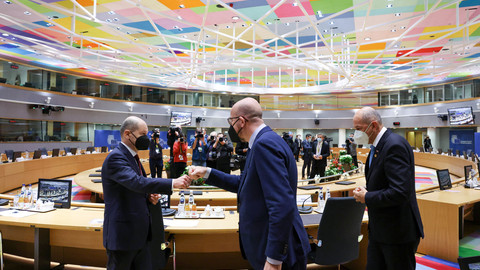Putin’s aggression in Ukraine has once again united Europe. From harsh sanctions to military aid to Ukraine, the European Union (EU) has shown a determined and unified response to the war in Ukraine. But what does the war mean for European foreign policy? And what early lessons can be drawn from the European response?
War is back in Europe. This is the grim reality of the last couple of weeks. On Thursday the 24th of February 2022, Putin ordered his Russian forces to launch an illegal offensive war against Ukraine. The war has already led to thousands of casualties on both sides and forced more than 3 million Ukrainians to leave their country. The vicious nature of the war has caused a dire humanitarian crisis for the affected people in Ukraine, including food, water and medicine shortages. Despite first talks between Russian and Ukrainian leaders, there are no apparent signs of de-escalation.
Rather, the fortunes of any near peace or ceasefire seem bleak. The war seems to escalate more and more, with new reports of Russian shelling of hospitals and religious institutions emerging. According to recent Ukrainian reports, Russian forces have even taken civilians hostage in a hospital in Mariupol.
Has the war united Europe?
From the European perspective, there has been one potentially positive sign of this conflict though: Putin’s aggression in Ukraine has led to a new-found unity among the Member States.
Only shortly after the invasion, the EU agreed to an unprecedented number of sanctions against Russia and Belarus, including a partial exclusion of Russia out of the SWIFT banking system. Moreover, the EU, which was bitterly divided in the refugee crisis of 2015 and 2016, jointly opened its borders to people fleeing from the horrors of war in Ukraine (this has justifiably sparked outrage about the disparate treatments of the different groups of refugees).
Another ground-breaking development in the European response to Moscow’s aggression occurred only shortly later on the 27th of February. The EU agreed to provide 500 million Euros in arms and other aid to the Ukrainian military. A few days later, Council President Charles Michel announced the commitment of another 500 million Euros in military aid to Ukraine. This marks another watershed moment in European foreign policy, since the EU had, until then, held back from directly supporting a warring country with military aid. That the EU, an alliance founded after World War II to preserve peace in Europe, now finances weapons for Ukraine, exemplifies the advanced development of the political Union. By supplying weapons to Ukraine, the EU is now moving closer to becoming a true Defence Union, which can effectively articulate its foreign policy priorities.
At the same time, European leaders have voiced loud rhetorical support for Ukraine and its President Zelensky, with Commission President Ursula von der Leyen going so far as saying that Ukraine should be an EU Member State in the future.
One must contend, however, that this newfound unity has its limitations. European leaders were and are in disagreement over the scope of the sanctions against Russia and the extent to which they should support Ukraine militarily. Similarly, they are divided about the speed at which to give Ukraine EU membership candidate status.
Adding to that, it remains unclear how long this unity will last. The ongoing war is going to have long-lasting humanitarian and economic consequences. Many countries in Europe have very close economic ties to Russia, making the EU’s sanctions increasingly painful. Similarly, the refugee waves from Ukraine threaten to overwhelm the corona-torn national bureaucracies. Continued European unity will therefore largely depend upon the willingness of the Member States to put its principles and its desire for a peaceful international order over short- and medium-term economic losses.
Lessons from the European Response
This horrific war is not even going on for a month yet. Nonetheless, already several lessons from the European response seem to emerge.
First, the much-cited truism of a Europe forged in crises continues to be true. The unity we see of the EU when it comes to Russia, going so far to finance military equipment for Ukraine, would have been unthinkable just months ago. Now the EU has shown it has the capability to be a potent actor advocating international peace.
Secondly, the current situation exposes the dangers of division between EU Member States when it comes to dealing with autocrats and national security issues. There are recent reports that showcase that Putin believed he would get away with his invasion because of the timid response of the west to past Russian aggressions. Due to internal divisions over the right approach to Russia, EU Member States didn’t take a firmer stance against Russian aggression in 2014 nor massively strengthened NATO’s Eastern flank, despite pleas from Eastern EU/NATO members to do so. Only when the EU takes a firm joint stance on such acts of aggression, based on its principles and security interests, can it exert wider influence on the world stage.
Lastly, the current crisis shows that leaders across Europe should put more trust into the moral courage of ordinary Europeans. Hundreds of thousands marched against the war and for peace in Ukraine in Prague, Berlin, Vienna and countless other cities across Europe. Across the continent, Ukraine and its people can see the solidarity of their European neighbours, as is currently showcased by the welcoming of more than 3 million refugees in the first two weeks of the war.
Polls show that Europeans are willing to endure economic hardship if it helps to stop Putin’s ruthless aggression. Harsh sanctions against Russia and its leadership are one important way the west can help to force Putin back to the negotiation table. Ukrainians are bearing the crushing brunt of this horrible war. But European leaders can also count on their people to shoulder significant burdens in the name of supporting Ukraine. Europeans want clear-eyed and courageous leadership in these difficult times of war. European leaders should keep that in mind when standing up to Putin.
It is clear that the Russian invasion has given a truly joint European foreign policy new momentum. Whether the EU chooses to continue to act in coordination against Putin’s aggression will likely decide the success of this feat.


